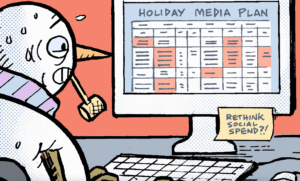“Data-Driven Thinking” is written by members of the media community and contains fresh ideas on the digital revolution in media.
Today’s column is written by James Rosewell, founder and CEO at 51Degrees.
The web was built on the vision that it would be free to the world as a public good and basic right for all.
While in many ways, the web has lived up to this vision, it has become a challenge to keep it open.
But this challenge we face – driven largely by trillion-dollar market cap oligopolies looking to enclose the “open web” to advance their own commercial objectives – is nothing new.
In a 1968 paper “The Tragedy of the Commons,” Garrett Hardin described the fate of a common pasture that was poorly managed and overconsumed from people acting in their own self interests. He portrayed the collective action that spoiled this shared resource as a tragedy, but the real tragedy is the notion that shared resources must be privatized to be sustainable.
But, as Nobel Prize-winner Elinor Ostrom has found, common regimes can be successful when resource cultivators are involved in the rule-making process and conflict-resolution mechanisms are easy to access.
Open web
“The Tragedy of the Commons” is a powerful metaphor for the web, a resource now used by more than 4.5 billion people globally.
We are at a point in history where if we don’t protect the open web from overzealous corporate control and take the time to find an enduring solution, future historians could be writing about “The Tragedy of the Open Web.”
What can you do about it?
To prevent this fate, all corners of the ecosystem must make their voices heard. 51Degrees and other members of the W3C’s Improving Web Advertising Business Group have put forward a draft charter to the W3C to form the Decentralized Web Interest Group. Its mission is simple: to identify and mitigate unintended consequences of new web proposals before they are adopted as standards. Underrepresented groups will be considered, and the current “browser knows best” approach will be thoroughly challenged.
We need more disciplines to be involved, a view shared by Mark Nottingham, co-chair of the Internet Engineering Task Force (IETF) and QUIC Working Groups and a member of the Internet Architecture Board. In a recent blog post exploring why IETF decisions should favor internet end users in conflicts between the interests of end users and other parties, Nottingham says that the internet’s challenges require input from policymakers, civil society, citizens, businesses and technologists.
“Without good communication, policymakers are prone to making rules that don’t work with the technology, and technologists are prone to creating technology naive to its policy implications,” he writes.
I agree. We need those affected by the changes proposed by the trillion-dollar oligopolies to speak out. Apple’s threat to kill off mobile advertising IDs will jeopardize the revenues for all iOS apps or perpetuate the monopoly of Apple’s payment solutions. Google’s Privacy Sandbox will similarly impact the decentralized, diverse and open web and could drive even more people toward its own dominant services. It is a blatant abuse of dominant market position to bundle consent with the use of essential services as currently practiced by vertically integrated platforms.
Magical solutions such as contextual, browser APIs or authentication solutions won’t solve these problems. We need to talk about how we can design a better web.
Unlike humanity’s other challenges, which require immediate attention and action, we can take the time needed to properly address the existential threat facing the world’s primary information and communication technology. We have the opportunity to produce a phenomenal open, competitive, enduring and decentralized web, without enclosing it in a series of walled gardens.
In the words of George Santayana, “Those who forget the past are condemned to repeat it.” History will judge us; I want to be proud of what they write.
Follow James Rosewell (@jwrosewell), 51Degrees (@51Degreesmobi) and AdExchanger (@adexchanger) on Twitter.













